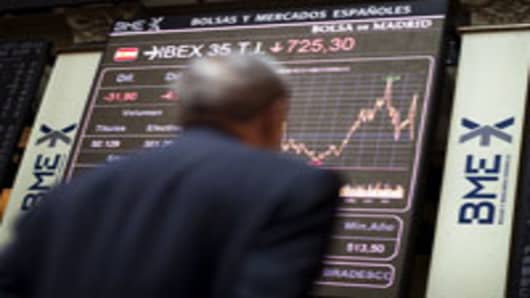Spain's short-selling ban came to an end on Thursday but analysts have told CNBC that although the lifting of the ban is a sign of improved sentiment, further downward pressure should be expected in the coming weeks.
At the height of Spain's crisis in July, Spain's market regulator Comision Nacional del Mercado de Valores (CNMV) ordered a ban on short-selling due to the "extreme volatility which may cause European securities markets to have a disorderly functioning."
Short selling refers to borrowing a financial instrument to sell it, in the hope of buying it back later at a lower price.
Short selling of financial stocks in Spain was blamed for worsening the country's crisis last year, when it was simultaneously facing higher bond yields and a capital flight.
Since then, the blue-chip Ibex 35 Index has soared 40 percent, helped by pledges from European Central Bank chief Mario Draghi and narrowing sovereign bond spreads.
(Read More: Worries Grow as Investors Pile Into Spain)
But the CNMW announced its decision on short-selling late on Thursday, lifting the ban on all stocks. Greece scrapped a ban on short-selling on Monday but decided to continue the ban for volatile banking stocks.
"In terms of image, the ban is not positive as an intervened market can be understood as a weakness," Soledad Pellon, a market strategist at the Madrid branch of IG Markets, told CNBC.com.
"The end of the ban would also mean that volume will increase to 2011 levels (the volume in the Spanish stock market dropped 24 percent in 2012 compared to 2011), which is very positive as a market with low volume is very inefficient and does not attract investors."
Global stocks, including many European benchmarks, have rallied in recent months on bullish sentiment. The U.K'.s FTSE 100 index has broken through the 6,300 point barrier, the S&P 500 cleared the 1,500 mark for the first time since 2007 and the German Dax is at multi-year highs.
(Read More: Spain Economy Minister Suggests No Need for Bailout)
But this bullish sentiment could come crashing down in Spain, at least in the short term, according to Pellon as stocks begin to look overbought. Will Hedden, a colleague of Pellon's at the London office agrees, saying a correction is long overdue.
"Reinstating the ability to sell the market short will likely bring about a short term correction in the market," he told CNBC.com, indicating any future writedowns in the banking sector could make financials particularly exposed.
"The bears haven't disappeared and it's likely that Spain could be the new whipping boy in the equity markets if [the ban is] lifted too soon."
Spain's underlying economy is by no means out of the woods. On Wednesday, data from the National Statistics Institute showed gross domestic product (GDP) fell 1.8 percent in the fourth quarter from a year earlier. Record unemployment and poor retail sales also added to what is undoubtedly a fragile economy.
(Read More: Investors Throw Spain a Lifeline as Economy Shrinks)
But Antonio Lopez, a Spanish equities analyst at Exane BNP Paribas isn't convinced the whole market will be hit by the ban lifting. He added that liquid stocks which have outperformed the market with no fundamental reason, and which have a high correlation to the country's sovereign spread, could come under pressure.
The ten stocks he singled out include financials Bankinter, BBVA, Santander, and Banco Sabadell. According to him, attention could also turn to broadcaster Mediaset Espana, construction firms Grupo ACS and FCC, IT company Indra and energy giants Acciona and Gamesa.
"We do not see any reason at all for the ban to continue, but at the end, we think is a political decision made by the new head of the CNMV, which has a quite a political background," Lopez told CNBC.com.
—By CNBC.com's Matt Clinch



